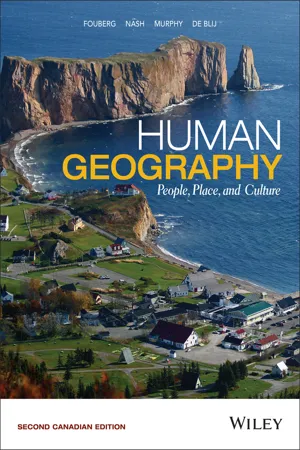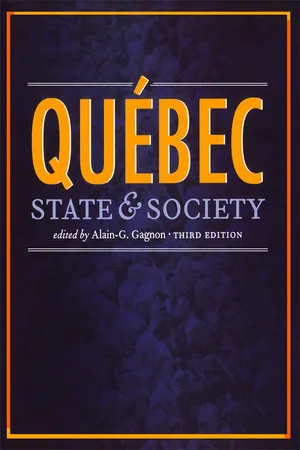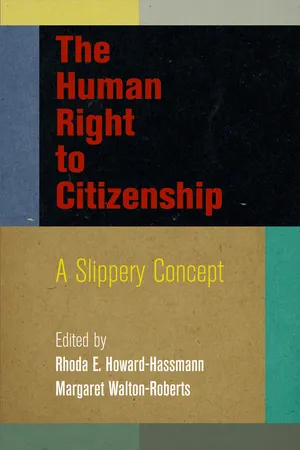Geography
Stateless Nation
A stateless nation refers to a group of people with a common identity, such as language, culture, or ethnicity, who do not have their own independent state or government. This term is often used in the context of geopolitics and international relations to describe groups seeking self-determination or autonomy within existing nation-states.
Written by Perlego with AI-assistance
Related key terms
1 of 5
6 Key excerpts on "Stateless Nation"
- eBook - PDF
Human Geography
People, Place, and Culture
- Erin H. Fouberg, Alexander B. Nash, Alexander B. Murphy, Harm J. de Blij(Authors)
- 2015(Publication Date)
- Wiley(Publisher)
Because a nation is identified by those who are able to define and control membership, we cannot simply define a nation as the people within a territory. Indeed, rarely does a nation’s extent correspond precisely with a state’s borders. For example, in the country of Belgium, two nations—the Flemish and the Walloons—exist within the state borders. While some groups who envision themselves as nations do not seek territo- rial control and autonomy, there are numerous examples of groups seeking independence and the creation of their own ter- ritorially defined nation-state—for example, the Kurds of Iraq, Turkey, Syria, and Iran; Tamils in northern Sri Lanka; and the Québécois in the province of Quebec. • Political geographers are interested in nations and states, their territorial organization and boundaries, and nationalist ideologies. Political geographers are also interested in the political organization of space from the global to the local. • Borders are never natural. They are always socially con- structed; they are products of social practice, historical context, and are often the result of conflict. • A state is not a “natural” organizational structure. It is a particular form of political and social order created by hu- mans. The state is a politically organized territory with a per- manent population, a defined territory, and a government. It must be recognized as such by the international commu- nity in accordance with international law. • States need to establish boundaries and do so in a number of different ways. Disputes between countries about boundaries take a number of different forms including definitional, locational, operational, and allocational. • A nation is a group of people who collectively understand themselves as having a shared history and a common cul- ture attached to a particular homeland. Some states are made up of many nations, and many nations do not have their own state. - eBook - PDF
- Gerard Delanty, Krishan Kumar, Gerard Delanty, Krishan Kumar(Authors)
- 2006(Publication Date)
- SAGE Publications Ltd(Publisher)
Mainstream social science literature largely fails to distinguish between key concepts of ‘nation’ and ‘state’. Anthony Giddens, for exam-ple, defines the nation as a ‘bordered power-container’ which exists ‘when a state has a unified administrative reach over the territory over which its sovereignty is claimed’ (1985: 120). Giddens is not alone in redefining the nation in purely political terms, and in the process losing its cultural significance. He defines the nation-state as ‘a set of institutional forms of governance maintaining an administrative monopoly over a territory with demarcated boundaries, its rule being sanctioned by law and direct control of the means of internal and external violence’ (Giddens 1981: 90). What is remarkable about this defini-tion is that it is really a definition of the state , making no mention of the nation as such. The whole point of the hyphenated term ‘nation-state’ is that it aligns the strictly political realm of state with the cultural one of nation, thereby fusing two analytically distinct spheres. Anyone who inhabits what have been called ‘Stateless Nations’ will know only too well that they are not the same thing; there are nations – imagined communities, in Benedict Anderson’s famous term – which are not formally indepen-dent states, and political entities – states – in which different territorial cultural groupings – nations – are present. Walker Connor (1990) once observed that fewer than 10 per cent of actual states are gen-uine nation-states in which nation-ness and state-ness coincide, that is, in which there is ethnic or cultural homogeneity within the boundaries of the state. In truth, there are states which are ethnically homogeneous, with possibly Iceland being the only one in Western Europe. ‘Ethnics’ are often spread across a vari-ety of states. - eBook - PDF
- Barney Warf(Author)
- 2006(Publication Date)
- SAGE Publications, Inc(Publisher)
NATION-STATE The nation-state is an ideal concept rather than one that is an actual or real geographic phenomenon. The nation-state is the ideological belief that the population of one state consists entirely of the members of one national group. Nearly all states in the world contain multinational populations and so violate the nation-state ideal. For example, Great Britain is home to the English, Welsh, Scottish, Ulster, and Irish nations. Those pressing for Scottish independence from Great Britain are acting in the nationalist belief that the Scottish people have a right to their own state, a Scottish nation-state. Although nation-states are practically nonexistent in the world, nationalist politics, or the desire to create nation-states, has been the most effec-tive and powerful ideology of modern times and is the cause of the ever changing boundaries of the world political map. Despite the fact that the nation-state is an ideal concept, everyday language usually denies the prob-lematic difference between political reality and rhetoric. Politicians usually convey the impression that their country is a nation-state, in other words, that their population shares a common national identity. However, contemporary geographic analysis is more focused on the national diversity within states and on how the geography of collective identity transcends state spaces in the form of networks. The nation-state was the fundamental geographic unit of the modern period. The Treaty of Westphalia of 1648 established the principle of state sovereignty, that is, a singular authority to rule over a territorial area defined by state boundaries. In Europe, the system of nation-states replaced feudal empires in which a hierarchy of sovereignty through baronial and majestic rule was played out over a network of fuzzy political boundaries. In addition, the ideal of the nation-state emphasized the ideal that sovereignty lay within the people rather than within a royal divine right to rule. - eBook - PDF
Quebec
State and Society, Third Edition
- Alain G. Gagnon(Author)
- 2019(Publication Date)
- University of Toronto Press(Publisher)
Stateless Nations or Regional States? Territory and Power in a Globalizing World MICHAEL KEATING Beyond the Nation-State Recent years have seen a vigorous debate about the past, future, and present of the nation-state and about the emergence of new forms of order above, below, and alongside it. For some, the nation-state remains the fundamental unit of political and social order; for others, it is fading away; while others again argue that it is being transformed. The problem is that the nation-state is itself such a complex concept. Some observers put the emphasis on the nation part of the expression to claim that, given the plurality of most states, the expression is a misnomer. Others put the emphasis on the state part, using the expression as a synonym for a sover-eign actor in world politics. It is probably most useful not as a description of a state of affairs, but as an ideal type of political order, with which we can compare regimes past, present, and future. Taken in this way, the key features of the nation-state are its internal and external sovereignty and its ability, within its territorial borders, to contain a range of social, political, economic, and cultural systems. Nation-states have often defined national cultures, in the process making a nation out of the state. They have defined the citizenry, who are the only ones endowed with full civil and political rights, and who comprise the demos underlying democracy. They create, define, and sustain political institutions, including systems of representation and accountability. Finally, they define and regulate a series of functional systems, in 391 19 392 Quebec: State and Society the economy, social integration, and other forms of regulation. These are, in the ideal type, linked to each other so that social solidarity is sustained by a common identity and common norms. This in turn facilitates the production of public goods and handles the externalities that could otherwise hamper economic development. - eBook - PDF
The Human Right to Citizenship
A Slippery Concept
- Rhoda E. Howard-Hassmann, Margaret Walton-Roberts, Rhoda E. Howard-Hassmann, Margaret Walton-Roberts(Authors)
- 2015(Publication Date)
- University of Pennsylvania Press(Publisher)
These are people who are stateless, not recognized as nationals by any state (see Belton this volume). 1 In fact, citizenship is a reciprocal relationship of rights and duties between individuals and states; therefore, stateless people cannot claim any rights from any state. In some cases international human rights law confers equal rights on both citizens and noncitizens. 2 However, since many coun-tries do not comply with international conventions such as the Interna-tional Refugee Convention (1951), the Convention related to Status of Stateless People (1954), and the International Covenant on Civil and Politi-cal Rights (1966), the rights of stateless people are not ensured everywhere in the world. Refugees and asylum seekers are also considered as nonciti-zens in host countries and frequently are also deprived of rights conferred by international human rights law. Therefore, the life of a noncitizen refu-gee or asylum seeker can become critical, due to the lack of food, water, shelter, education, means of livelihood, medical support, sanitation, and any social, political, and civil rights. Such individuals can become objects of exploitation, oppression, torture, and sexual harassment and are even subject to death due to their statelessness. They are dealt with as if they were less than human beings, on the slippery citizenship spectrum; many State of Stateless People 63 stateless people have slid almost as far as they possibly can. Stateless peo-ple’s condition of vulnerability experienced in everyday life is reproduced by the state’s discourse of noncitizenship. In fact, the framework of modern nation-states produces the legal categories of citizen/noncitizen, which reproduces and confirms the status of statelessness, making some people more vulnerable than others. Lack of citizenship and refugeehood are com-ponents of this heuristic notion of slippery citizenship. - eBook - PDF
Nationalism in the Twenty-First Century
Challenges and Responses
- Claire Sutherland(Author)
- 2011(Publication Date)
- Red Globe Press(Publisher)
102 4 Whither the Stateless Nation? Integrating Sub-State Nationalism How do sub-state nationalists define independence in an interdependent world? What roles do ethnicity and territory play in their ideologies? This chapter focuses on sub-state nationalism and its response to the cosmopolitan challenge. Every nationalist variant – from terrorist nationalists, through democratic independence movements, to estab-lished nation-states – claims the right to represent its chosen nation. To that extent, the legitimating practices of government nation-building are no different to those of sub-state nationalist ideologues. Contemporary sub-state nationalists set out to articulate a new political arena, however. They reinvent sub-state territories as centres of social, economic and political activity, as well as an alternative locus of identity to the existing nation-state construct (Keating 2001). Sub-state nationalism in liberal democracies tends to be a mix of civic and ethnic markers, mobilised differently according to the changing constellations of power at state and international levels (Keating 2001, 12). Contrary to the focus on govern-ments in the study of nation-building, political parties are among the dominant actors at the sub-state level, though their control of a devolved administration is also a powerful nation-building tool. As demonstrated in the cases of Scotland and Bavaria below, sub-state nationalists often attempt to manipulate a rather diffuse sense of national identity. And as we shall see in the discussion of sub-state mobilisation in Africa, ethnicity also provides an important focus for collective action. The chapter argues that contemporary sub-state nationalism is flexible enough to adapt evidence of long-standing community links to the current political environment, but also of manipulating and inventing traditions along the way. As an eminently adaptable ideology, it co-opts elements as diverse as ethnicity
Index pages curate the most relevant extracts from our library of academic textbooks. They’ve been created using an in-house natural language model (NLM), each adding context and meaning to key research topics.





